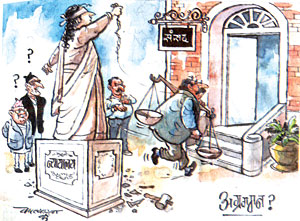 CARTOON BY BATSAYAN IN KANTIPUR |
No pragmatic politician complies willingly with the directives of courts, committees or commissions unless they are in a tight spot and are looking for legal respite. In a democracy, an elected official is not answerable to anybody save his own constituency. Jha is on solid ground here. Almost all Madhes-based parties have applauded his refusal to re-take the oath of office in Nepali.
Pahadi-dominated parties are furious. Jha has publicly challenged their linguistic superiority. But electoral calculations prevent them from publicly speaking out against the language rights of non-Nepali speakers. Hence, a purely political issue is being given a constitutional colour: the argument being that even if the judgment of the court was flawed, Jha should have resigned to uphold the 'rule of law'. A pliant person could then have been elected in
his place.
The rule of law is meant to be a deterrent against the abuse of power. The concept is turned on its head when the law becomes merely a tool to give continuity to the status quo. It then becomes legal arbitrariness, which creates grounds for open defiance. The judges of the Supreme Court need to reflect whether their ruling about the legality of Jha's oath was based on rule of law or rule by law. Legal opinion is divided along ethno-political lines.
The political fallout of Jha's decision remains to be seen. If Sadbhavana, TMDP and MJF (Democratic) were to stick to their election manifestos, Prime Minister Madhav Kumar Nepal would have to quit. But if Madhesi parties in the anti-Maoist coalition were to sign on the dotted line, Mahanth Thakur and Bijaya Gachhadar may as well begin preparing to set up a new 'nationalist' party.
One of the unintended consequences of the face-off between an elected vice president and a few nominated judges of the Supreme Court is that the Constituent Assembly can now discuss bases of popular sovereignty, of which the democratic form is parliamentary supremacy.
The principle of constitutional supremacy flows from the belief that all politicians are fallible while most judges are angels. This often leads to judicial supremacy. Under communist or military rule, judges as well as parliamentarians are expected to be subservient to either the politburo or the junta. Sovereignty is then interpreted to mean the right of the rulers to do as they please.
The 1990 constitution ended up establishing judicial supremacy when one of its framers agreed to become the chief justice. The executive became impotent, the legislature was made dysfunctional. Whims of the court reigned supreme. Finally, the constitution collapsed under the weight of its own contradictions, the Maoists just accelerated the process.
The CA needs to assert itself and tell the courts to leave politics to politicos. The best place to debate which language the vice president should take his oath in is the CA. It's good to have experts on tap, but a priesthood of judges at the top of the constitutional hierarchy is a fundamentally flawed idea in a democratic republic of multiple minorities.



